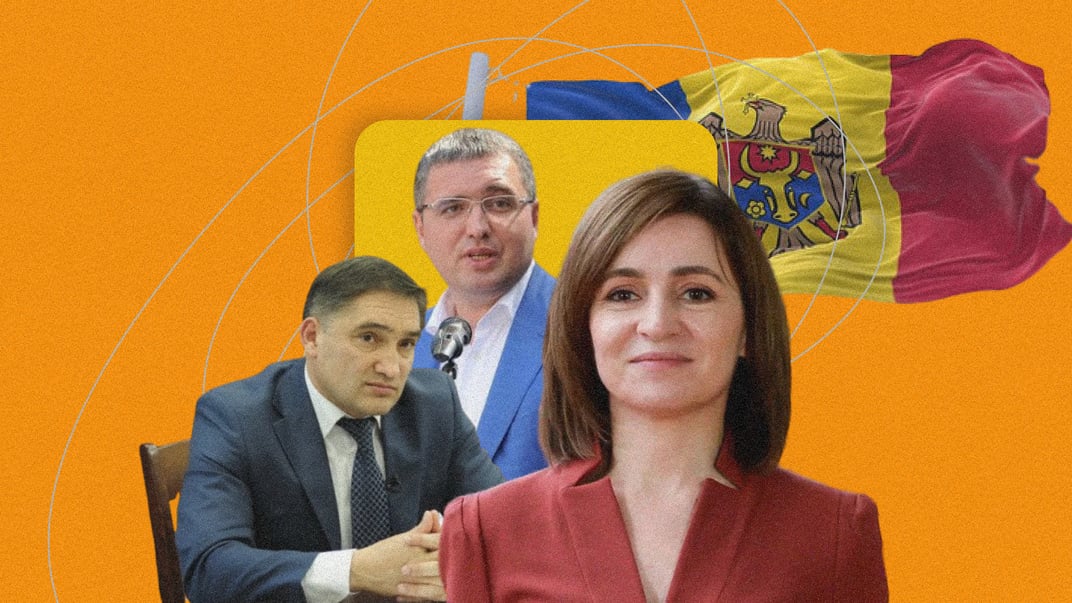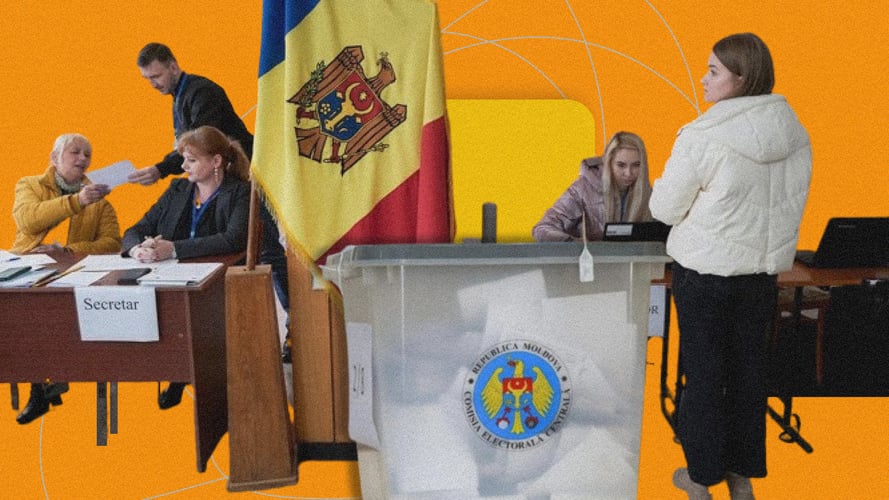Vote buying, fraud, and Russian funds. What we know about the presidential elections and referendum in Moldova.

Candidates
The citizens of Moldova chose the next president of the country from 11 candidates:
- Maia Sandu – the current leader of the state, who pursues an active pro-European policy, and during her term, the country even received candidate status for EU membership.
- Alexander Stoianoglo – the former Attorney General of the country, a representative of the pro-Russian "Party of Socialists of the Republic of Moldova," with Gagauz heritage. In 2021, he was accused of corruption.
- Renato Usatii – the leader of the Eurosceptic and pro-Russian "Our Party." He holds Russian citizenship and was accused of threatening the country's top leadership in 2015.
- Andrei Nastase – the chairman and founder of the "Platform for Dignity and Truth" Party, a former ally and now critic and competitor of Maia Sandu.
- Octavian Tsiku – a former boxer and member of the Moldovan parliament since 2019. He served as the Minister of Youth and Sports in 2013.
- Ion Chicu – the former Prime Minister of Moldova, who was an advisor to pro-Russian President Igor Dodon.
- Irina Vlah – a member of the Moldovan parliament since 2005, previously affiliated with the Communist Party of Moldova, advocating for closer ties with Russia, though later she began to assert that Moldova's future lies in Europe.
- Vasili Tarlev – the former Prime Minister of Moldova and co-chair of the "Revival" party. According to media reports, he traveled to Moscow, and his name was "discussed in Moscow as someone who could be a pro-Russian presidential candidate."
- Natalia Morar – a journalist who was banned from entering Russia for four years due to the investigation "Black Cash of the Kremlin." In 2023, she initiated meetings among opposition politicians to find a "single candidate" from the opposition. Ultimately, she announced her candidacy for president.
- Tudor Ulyanovskiy – the Minister of Foreign Affairs and European Integration of Moldova. A career diplomat, referred to as an "independent and conditionally pro-European candidate."
- Victoria Furtună – a career prosecutor who has not previously engaged in politics. She announced her candidacy in Transnistria, where she recorded a campaign video and stated that this territory could soon become a second front line. If elected, she "promises to shield Moldova from conflict."

What Went Wrong?
The October poll by WatchDog.MD conducted just before the elections showed that most voters (35.8%) preferred Maia Sandu, while Stoianoglo was predicted to receive 9% of the votes, and Usatii 6.4%.
Regarding the referendum, sociological studies indicated that 55.1% were ready to vote for the inclusion of European integration in the Constitution of Moldova. Conversely, 34.5% opposed it, and another 7.9% stated they were undecided.
However, the actual results turned out differently.
Thus, Sandu predictably secured first place, garnering 42.45% of the votes. However, her lead over competitors was not substantial: Stoianoglo received 25.98%, while Usatii got 13.79%. In Sandu's homeland, the Fălești district, the current leader secured only third place, with the most votes going to Renato Usatii.
The results of the referendum were even more surprising. The citizens of Moldova were asked: "Do you support amendments to the Constitution aimed at joining the Republic of Moldova to the European Union?"
If supported, the preamble of the Constitution would need to be supplemented with the following words: "... confirming the European identity of the people of the Republic of Moldova and the irreversibility of the European course of the Republic of Moldova, proclaiming integration into the European Union as the strategic goal of the Republic of Moldova."
As soon as the vote counting began, it became evident that the majority of Moldovans opposed constitutional changes in the process of European integration. For almost the entire evening of October 20, the referendum results remained nearly unchanged: 45% in favor of changes and 55% against.
The foreign diaspora "saved" the referendum results. When the counting of votes from abroad commenced, the situation began to stabilize. Finally, as of 12:00 on October 21, 50.46% of Moldovan citizens supported constitutional changes, while 49.54% did not.
Sandu's reaction was quite unexpected – she delivered a one-and-a-half-minute speech, claiming that the country faced unprecedented fraud.
"Moldova is confronted with an unprecedented attack on the freedom and democracy of our country, both today and in recent months. Criminal groups, working in conjunction with foreign forces hostile to our national interests, attacked our country with tens of millions of euros, lies, and propaganda, using the most disgraceful means to keep our citizens and our country trapped in uncertainty and instability."
"We have clear evidence that these criminal groups planned to buy 300,000 votes. We are awaiting the final results, and we will return with decisions,” Sandu stated, leaving without taking questions from journalists, despite the many inquiries.
Russian Influence
The events in Moldova did not go unnoticed by Russia, which attempted to use the elections and the referendum for its own interests.
Just a few weeks before the vote, the head of the Moldovan Anti-Corruption Prosecutor's Office, Veronica Dragalin, stated that law enforcement discovered over 130,000 citizens, whose accounts received a total of more than 15 million dollars from Russia in September alone.
Bloomberg journalists wrote that funds from the Russian Federation were being transferred to cards linked to the Russian Ministry of Defense, and then bribed voters were sent instructions via the Telegram messenger on how to vote and spread lies about the European Union within Moldova.
Just two days prior to the elections, Moldovan Deputy Prime Minister Kristina Gerasimova reiterated that Russia spent nearly 100 million euros trying to disrupt the presidential elections and the referendum on EU membership.
"Our partners should understand one thing: we are a testing ground for new methods – and everything that works in Moldova will be used in other countries,” the official stated.
She also emphasized that it was crucial for Russia to prevent Moldova from joining the EU. Among other things, Russia spreads the narrative that membership in the bloc equates to war. Gerasimova noted that due to Russia's invasion of Ukraine, Moldovans are afraid to vote for EU membership in the referendum.
There was also involvement from pro-Russian Moldovan politicians. The publication NewsMaker reported that the strengthening of Russian positions just before the elections and referendum was facilitated by a corruption network of paid pro-Kremlin activists created by former deputy and businessman Ilan Shor, who is hiding in Russia due to being placed on an international wanted list for the "stolen billion" case.
Publicly, the Moldovan businessman and his associates did not name the candidate they supported in the elections, but Moldovan journalists were able to prove that Shor is connected with at least two pro-Russian candidates – Vasili Tarlev and Victoria Furtună, who together received 116,000 votes from Moldovan voters (7.8% of the votes combined).
The candidate Octavian Tsiku also stated about the Russian influence in the elections. He noted that these elections were "neither honest, nor free, nor democratic, but were compromised by Russian money."
Moreover, Russia actively operated in Gagauzia – an autonomous territorial unit in southern Moldova, led by openly pro-Russian politician Evgenia Gutsul. This region traditionally advocates for closer ties with Moscow and against European integration. For instance, in March 2024, the politician traveled to Russia and complained about the "oppression" of the local population, asking for "support" from Moscow. On October 14, the EU imposed sanctions against Gutsul.
In Russia itself, where a significant Moldovan diaspora resides, people also actively participated in the voting, however, most of them expressed negative views towards Maia Sandu, as the official Kishinev allowed only two polling stations to be opened for 300,000 Moldovans in Russia.
What’s Next?
None of the presidential candidates garnered 50% of the votes, so on November 3, Moldovan citizens will face a second round of elections, where the current leader of the country will compete against Alexander Stoianoglo